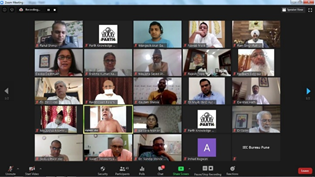 22 May 2020, Mumbai: WHO India and UNICEF came together to organize a virtual meet of the faith-based organizations and the state government officials in Mumbai under the ambit of the larger risk communications and community engagement strategy. The objective of the meet was to connect the humanitarian organizations on a common platform for better synergy with government efforts for a collective fight against Covid-19. The participating faith-based organizations were: Catholic Faith, Art of Living, Jamaat-I-Islami Hind, All India Muslim Personal Law Board, Jamate-e-Ulema, All India Ulema Council, ISKCON, Isha Foundation, Rama Krishna Math etc., along with the representatives from UNICEF, WHO field staff from Maharashtra and State government officials.
22 May 2020, Mumbai: WHO India and UNICEF came together to organize a virtual meet of the faith-based organizations and the state government officials in Mumbai under the ambit of the larger risk communications and community engagement strategy. The objective of the meet was to connect the humanitarian organizations on a common platform for better synergy with government efforts for a collective fight against Covid-19. The participating faith-based organizations were: Catholic Faith, Art of Living, Jamaat-I-Islami Hind, All India Muslim Personal Law Board, Jamate-e-Ulema, All India Ulema Council, ISKCON, Isha Foundation, Rama Krishna Math etc., along with the representatives from UNICEF, WHO field staff from Maharashtra and State government officials.
Mr Rajesh Tope, Minister Public Health and Family Welfare, Maharashtra in his address stated, “The role of humanitarian actors in mitigating the impacts of Covid-19 by providing communities with much needed guidance, support and empathy is critical. Faith based leaders can promote positive practices during such challenging times because people trust and look at leaders as the real ‘Corona Warriors.’
He appealed to the religious leaders to raise their voice against stigma and discrimination by sharing powerful examples from religious scriptures through their network and give a voice to the unseen ‘Corona Heroes’ in the field.
Mr Nawab Malik, Minister of Minority Affair and Skill Development Department emphasized on gaining confidence of the community during COVID-19 pandemic. He appealed to the religious leaders to support government’s efforts through provision of quarantine facilities at religious institutions. This will help in building confidence of people and reinforce the government’s efforts to provide enhanced bed capacity
“Faith-based organizations and religious leaders have a critical role in fighting the pandemic. Involvement of faith leaders can address stigma and discrimination amongst communities and create awareness on key measures for preventing the spread of Covid-19”, shared Payden, Deputy Head of WHO Country Office for India
The religious leaders present at the virtual meet unanimously echoed that this pandemic has united everyone. Compassion and cooperation are important virtues that every human must emulate and put up a collective fight to defeat the novel coronavirus.
WHO India and UNICEF have been supporting MoHFW in implementing risk communication and community engagement strategy which has reached out to 4.88 million people in the state, including all the divisional, district and block level functionaries of public health department (PHD), Women and Child Development (WCD), Water Supply & Sewerage Department (WSSD), and education departments. Religious sermons and messages by faith leaders in local language are disseminated through various channels and during the frontline workers trainings, reaching out to 1 79 519 people with messages on prevention and management of response to the pandemic.
Going forward, these interventions will facilitate in building faith-based alliance at the state level and supporting the state’s response to Covid-19. This alliance will engage with communities at regular intervals under the guidance of the state government, and promote safety measures, advocate for the well-being of the population at-risk and sensitize the communities to not discriminate the health workers and people infected with Covid-19.
